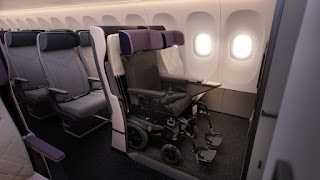Passengers with disabilities have described harrowing problems during air travel, including bungled security screenings, risky transfers onto planes, and lost and damaged wheelchairs.
Their plight has caught the attention of Congress, where bipartisan bills focused on improving air travel for people with disabilities are being introduced in both the House and Senate.
The Mobility Aids on Board Improve Lives and Empower All Act, introduced on 05 May 2023, would require the Transportation Department to publicly report on the type of damage that occurs to wheelchairs and other mobility aids. It would require airline carriers to provide information to passengers to ensure a mobility aid can safely fit on a plane.
It would also order the Transportation Department to research the technical and financial feasibility of allowing passengers to board a flight directly in their wheelchair, rather than being transferred out of their wheelchairs and put into a regular seat.
The Mobile Act was introduced in the Senate by Sens. Tammy Duckworth (D-Ill.) and John Thune (R-S.D.) and in the House by Reps. Steve Cohen (D-Tenn.) and Pete Stauber (R-Minn.).
The act comes as Congress prepares to reauthorize the Federal Aviation Administration’s funding and programs this year. Disabled passengers have called for more airline accountability and accessibility to be included in the reauthorization act.
“For passengers who use wheelchairs, traveling can oftentimes be difficult and frustrating,” Thune said. “I’m proud to join Senator Duckworth in introducing this common-sense legislation that would improve safety and accessibility for individuals who use mobility aids to help ensure their travel experience is as smooth and hassle-free as possible.”
In 2022, 11,389 wheelchairs, power wheelchairs and scooters were lost, damaged, delayed or stolen, the highest number since the Transportation Department was first required to report on this data in 2018.
Duckworth, who uses a wheelchair, said consumers don’t have information about the extent of the damage done, which is crucial to empower disabled people to make better decisions about which airlines to fly.
For example, while armrests and footrests tend to break a lot, this type of damage doesn’t render a device inoperable. But right now, there’s no way to know which airlines consistently cause catastrophic damage to wheelchairs versus those that report minor damage.
“It would be good for me as a wheelchair user to know that a particular airline does a lot of damage,” Duckworth said.
And if someone’s mobility aid, which could be a wheelchair, scooter or walker, does not fit through the opening of a plane’s cargo hold, customers with disabilities are either forced to leave the plane and get moved to another flight, or agree to have their mobility aid sent on a different flight, which can leave them stranded at the next airport until it arrives.
“For some people, just being moved in and out of your wheelchair is a medical risk,” Duckworth said.
For many disabled people, the goal is to be able to directly board a flight in their wheelchair or power wheelchair. Doing so would ensure that their devices aren’t damaged or lost, and would eliminate the risk of being dropped or injured during a seat transfer, said Heather Ansley, associate executive director of government relations with Paralyzed Veterans of America.
“This isn’t just a customer service issue; this is actually a safety issue,” she said. “If people don’t have access to their devices or a safe way to board the plane, then they’re subjecting themselves to injury.”
And while redesigning planes to accommodate wheelchairs would cost money, Duckworth said she believes doing so would benefit the economy in the long run, especially because the country’s aging population is more likely to use wheelchair in the future.
“The idea of a convertible seat is not new. We have it on trains, we have it on buses,” Duckworth said. “It is very much possible, and I’d like to get the studies done to see how viable it is in terms of commercial air travel.”
Airlines for America, a trade group representing air carriers, said it supports the bill and wants to ensure a positive and safe experience for all passengers, including those with disabilities.
“We are committed to continuing to work with the disability community, aircraft and mobility aid manufacturers and safety regulators to explore safe and feasible aircraft solutions that reduce barriers to air travel,” Marli Collier, a spokeswoman for the association, said in a statement.
A 2021 report found that on most airplanes, removing two rows of seats should allow the installation of in-cabin wheelchair securement systems with no formidable issues. The report noted that further studies on feasibility and safety are needed.
Source: The Guardian

